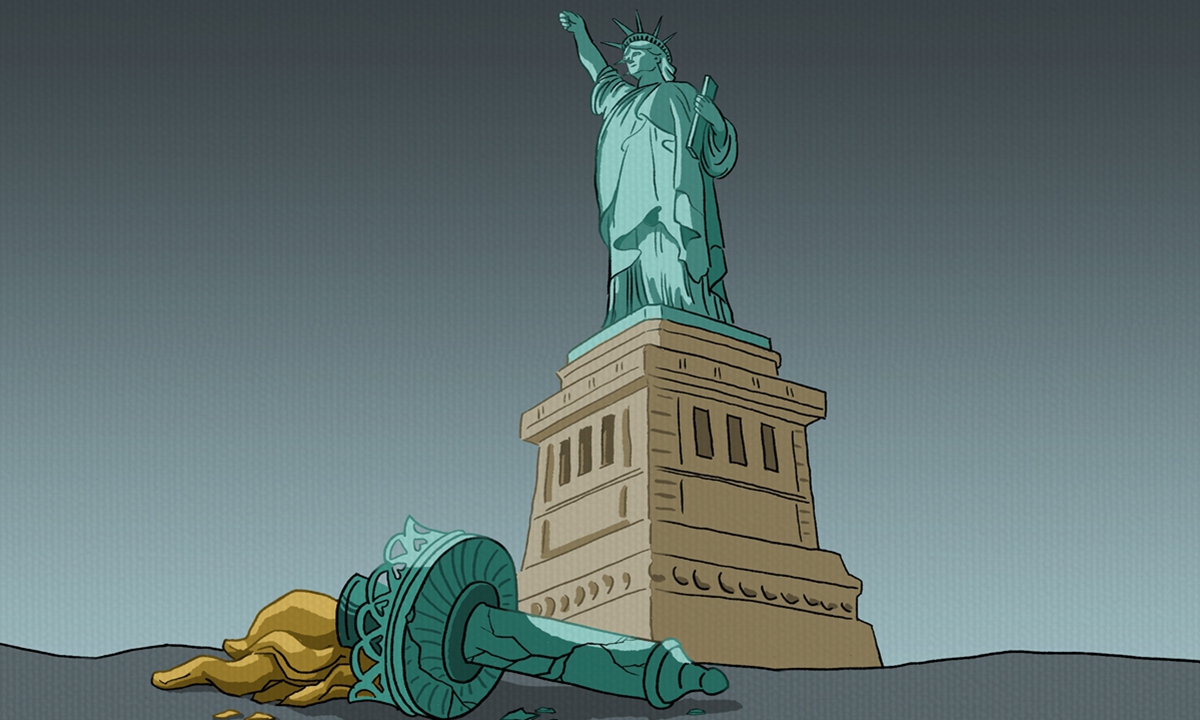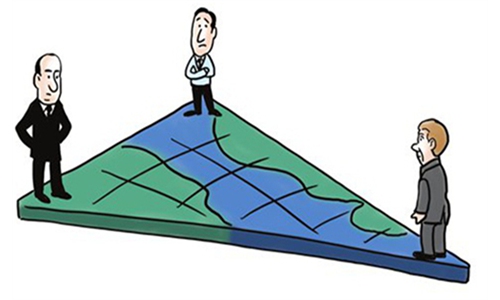
Degradation in the Western system Illustration: Liu Rui/GT
Will the Cold War come back? Elites and politicians in the strategic domain are getting more serious about this question after US President Joe Biden declared to forge an "alliance of democracies". After the China-US Alaska talks on March 19, Chinese State Councilor and Foreign Minister Wang Yi's visit to the Middle East and his meeting with Russian Foreign Minister Sergei Lavrov was described by the New York Times as an attempt to forge an "alliance of autocracies." "The world is increasingly dividing into distinct if not purely ideological camps, with both China and the US hoping to lure supporters," it read.
The US always had the Cold War mentality during and after the Cold War. Biden made that clear in his first presidential news conference on March 25 when he called the challenge from China and Russia "a battle between the utility of democracies in the 21st century and autocracies." Biden's alliance strategy strengthened both the Cold War mentality and actions at the same time, trying to make the world believe that the Cold War was inevitable.
"But it's almost impossible to divide the world into two separate camps, because the world is not just the US and China. There are many countries in the world and many international organizations, and they have different voices about where the international order is moving toward." Li Haidong, a professor at the Institute of International Relations of the China Foreign Affairs University, told the Global Times on Sunday.
The objective reality of the declining soft power of the US proves that the Cold War order that the US desires ̶ an autocracy camp against a democracy camp ̶̶ will not become the mainstream value of the world. The poverty, racial discrimination, collapse of democracy and economic recession that the US faces at home will not be solved by dividing the world into two camps. Moreover, none of the US allies will be willing to follow the US on every issue or take sides against China. US has its strength, absolutely, but it should not overestimate its omnipotence.
Behind the Cold War mentality was the idea of trying to resolve internal divisions in Western society by means of instigating external challenges. The result is a Washington that is unable to focus on solving its domestic issues, and a climate that makes it difficult to work with other nations on global issues. "The most effective way to deal with US' desire to divide the world is to establish a multilevel equilibrium in different directions." Li noted.
Robert Kagan described the US as a "dangerous nation" in his book Dangerous Nation: America's Place in the World, from its Earliest Days to the Dawn of the 20th Century. Exactly. The diplomatic policy of the US has become more and more irrational, thus making the country a dangerous one. It looks at China whenever making a policy. Will all countries need to take sides between the US and China in their policymaking and economic development?
US and Western politicians with political amnesia seem to have forgotten what the ideological opposition in 1947 has brought to the world. It has caused long-term confrontation between the East and the West, impeded the integrated development of the world, caused the division of Germany, Korea and other countries, and triggered local wars. When security and survival become the overwhelming priority, how can we talk about development?
In the Cold War era, the two camps were isolated from each other and formed two parallel markets, which brought incalculable negative impact on the development of the world economy. The development of the world economy evolved from the "two camps" and "three worlds" model to the current huge and unified division of labor system that spans regions and political systems and covers almost all countries is one of the biggest achievements of economic globalization. As countries become increasingly dependent on each other on market supply, manufacturing, and division of labor, a new cold war will inevitably lead to the collapse of the industrial chain and losses for both sides.
Cold War mentality and forcing other countries to take sides is not a demonstration of US' power. However, as Bloomberg mentioned in an article entitled "US-China Cold War Will Have More Than Two Sides", that "such cold war ideologies can never truly replace [US'] messy reality." In short, Cold War mentality won't restore US' declining soft power.


